Climate and Punishment
Air Date: Week of July 1, 2022
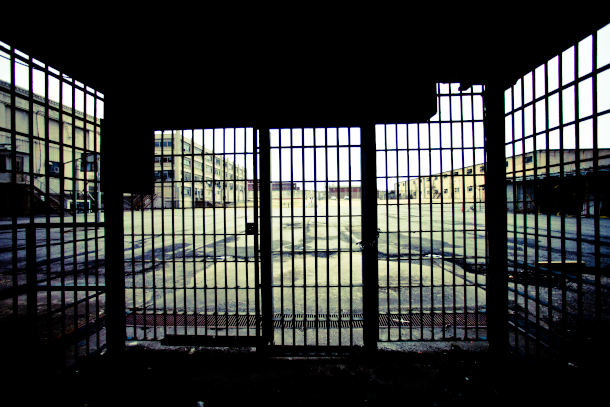
In extreme heat, prisoners’ health can decline, especially for those with pre-existing conditions. In a month-long heat wave in Texas in 2011, 10 incarcerated people died from heat-related illnesses. (Photo: Thomas Hawk, Flickr, CC BY 2.0)
America’s aging prison facilities are largely unprepared for climate impacts and often lack air conditioning, wildfire evacuation plans, and hurricane strategies, and some inmates have died from extreme heat. Journalist Alleen Brown talks with Host Steve Curwood about how U.S. prisons reveal the intersection of mass incarceration, systemic racism, and climate change.
Transcript
BASCOMB: It’s Living on Earth, I’m Bobby Bascomb.
CURWOOD: And I’m Steve Curwood.
Prisons are not expected to be pleasant, but with the growing risks of extreme heat waves and wildfires, some are ill-prepared to keep jail terms from becoming death sentences. Some inmates have pre-existing health conditions that are exacerbated by heat and wildfire smoke, and some take mental health medications that can also make people more susceptible to heat. Reporters for the Intercept have found that more than a third of the 6500 or so jails and prisons in the US are in places where 50 days a year on average the heat index is 90 degrees or more. The climate hazards for prisoners come from a pervasive lack of air-conditioning, faulty infrastructure, and vague evacuation plans. Reporter Alleen Brown, worked on this investigation for the Intercept and joins us now. Alleen Brown, welcome to Living on Earth!
BROWN: Thank you so much for having me.
CURWOOD: So, tell me a story of a prisoner or prisoners who have been mistreated because of situations related to climate disruption. I know you have many, but maybe you can tell me one?
BROWN: Yeah, absolutely. I think the most striking story that I've heard is that of Angel Argueta Anariba. So, Angel grew up in a family that lived off of farming in Honduras. So in 1998, Hurricane Mitch hit Honduras, and his family lost everything, you know, property, land, jobs, crops, and he had two little kids. So, he traveled to the U.S. to try to support his family.
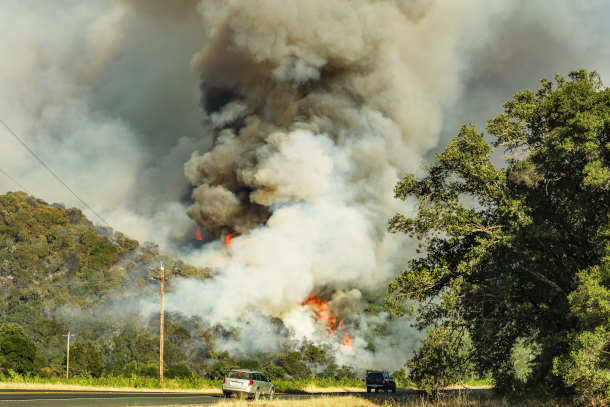
Prisons in California often have minimal evacuation plans for wildfires like this one in Mendocino County in 2018. One in five California correctional facilities are in the 95th percentile for wildfire risk in the U.S. (Photo: Bob Dass, Flickr, CC BY 2.0)
CURWOOD: That's right. I believe that something like 20% of the housing stock in Honduras was destroyed in that storm.
BROWN: Yeah, I mean, the country was hit really hard, and the government just did not have the capacity to respond effectively. So Angel came to the U.S. and he lived here for about a decade before he was arrested for an incident that he attributes to self-defense. He served out a seven-year sentence that the court deemed to be appropriate. But then like many immigrants, he was delivered directly to ICE detention because he was undocumented. So the worst was in 2020, at the Catahoula Correctional Center, when Hurricane Laura hit, the lights and water went out at the facility for four to five days.
CURWOOD: Now, where is this? What state?
BROWN: Sure, this is in Louisiana. So you know, a state that is notorious for its climate vulnerability, and a state where there's actually a lot of ICE detention facilities. So with the electricity out, there was no air conditioning and according to Angel, the space felt like it was about 100 degrees. A couple of inches of water pooled on the ground and maybe one of the worst parts was that the toilets weren't working, so they overfilled. Some people were forced to defecate on disposable trays that meals had been served on. And with workers avoiding entering the dorms, the garbage piled up. Angel said the smell was just excruciating. And you know, for Angel who has asthma, the heat and the smell really exacerbated that health condition.
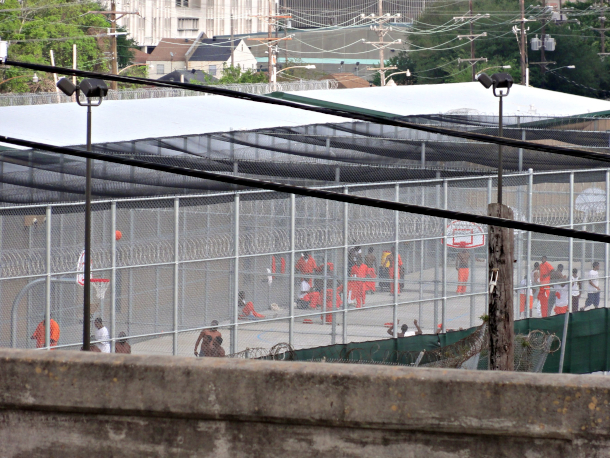
Prisoners during recreational time at the Orleans Parish Prison. During Hurricane Katrina in 2005, prisoners were left locked in their cells as facilities flooded. (Photo: Bart Everson, Flickr, CC BY 2.0)
CURWOOD: So now, what's been the response of the legal system? I mean, there's what, was it the Eighth Amendment of the U.S. Constitution against cruel and unusual punishment, that sort of thing?
BROWN: So, especially in Texas attorneys have argued Eighth Amendment violations due to conditions related to heat. You know, in Texas, less than a third of state prisons have full air conditioning, or that was the case as of 2020. 21 facilities at that point had no air conditioning at all. And so, around 2010-2011, a number of people died due to heat related conditions and family members sued. So, because of those lawsuits, Texas had to start taking some measures to protect the health of the most vulnerable people within that system. But you know, family members of incarcerated people and people who are incarcerated themselves say that those measures have not been sufficient to protect them.
CURWOOD: Now, what kinds of government actions are we seeing to deal with this? I mean, of course, the South has long had the reputation of being rough on prisoners. What about more progressive states like California?
BROWN: Sure. So, I would say California has also been really slow to address these issues. You know, in California, one of the climate issues that people who are incarcerated have really called out again is the issue of wildfires. About a fifth of the facilities in the state we found are in the 95th percentile for wildfire risk in the nation. So, there, a lot of the, the community members organizing around this issue have focused more on getting facilities shut down and getting people released than they have on necessarily infrastructure adjustments. And the governor of California has committed to shut down a handful of facilities in the next few years. But organizers are saying that they want 10 facilities shut down and 50,000 people released in the next five years. And they don't want a bunch of money invested into new infrastructure.
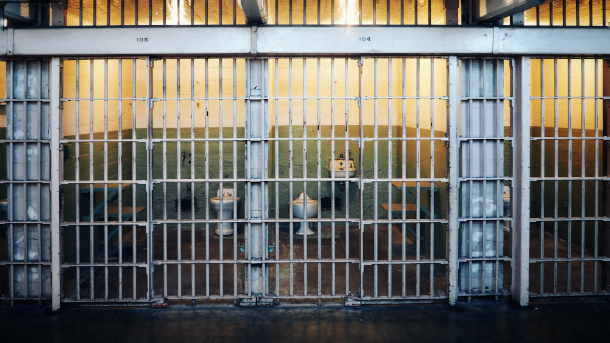
When power outages occur in prisons, waste systems can fail. Conditions can quickly become unsanitary and hazardous. (Photo: Umanoide on Unsplash)
CURWOOD: Briefly, what's their argument? Why do these people need to come out of jail?
BROWN: So I mean, the argument of a lot of researchers, in addition to organizers, is essentially that this system of mass incarceration is at a crossroads where, with the climate crisis deepening, government officials can either invest a whole lot of money in new infrastructure or they can start to think about new ways of accountability. So, a lot of people are arguing that there's no infrastructure investment that will be sufficient to address this problem. And the only real climate adaptation strategy for prisons is to shut them down. A lot of people also argue that these facilities and the system of mass incarceration doesn't actually do what it's supposed to do. You know, these facilities don't rehabilitate people or keep communities safe. Like climate change, prisons make vulnerable communities more vulnerable. I think for a lot of people organizing around abolition, climate is just another reason to think of new accountability strategies.
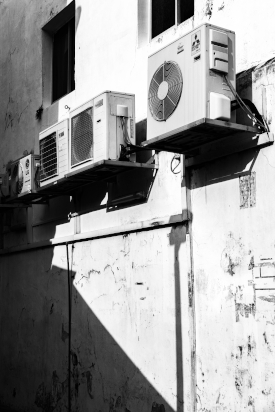
Air conditioning is widely regarded as an essential utility in the American South and West. At least 14 of the hottest states do not have universal air conditioning in their correctional facilities. (Photo: Gervyn Louis on Unsplash)
CURWOOD: So, sometimes to fight the wildfires prisoners are used in places like California, but to what extent are prisoners at risk from the smoke and even the flames of wildfires in California.
BROWN: So, one example was the California Correctional Center in Susanville, California. So, as people were told to prepare to evacuate in the community itself, people inside one of the units at the California Correctional Center had been without power for about a month, because the wildfires had taken down power lines in the hills nearby. Most of the facility was on generator power, but this unit had an emergency generator that failed. So, they'd been sitting basically in the dark with little to distract themselves, you know, more restrictive detention, they couldn't kind of have their time in communal areas because of the power outage. And all this time, the anxiety was just building around the wildfires that were approaching. At times the ventilation would go out, and it was quite smoky. One person that I spoke to said that, in his dorm, there were padlocks actually put on individual cells because the locking system was typically electronic. And when he asked a guard what would happen if the fires came too close, he basically told him that “you guys are staying here.” Whether or not that's true, it's very scary for someone who's stuck in a facility as fires are coming closer. And as I tried to find out exactly what kinds of plans California has in place where it comes to evacuations and wildfires, I really got minimal transparency. Basically, California says that, of course, they have emergency plans, evacuation plans, but they cannot share any details because it's a security risk. For families that have had loved ones living through the COVID pandemic while incarcerated, that kind of vague reassurance is just not enough.
The U.S. has the highest incarceration rate in the world. Prisoners are some of the most vulnerable to the climate crisis given that they’re at the mercy of a prison system plagued with problems.
— The Intercept (@theintercept) February 12, 2022
Climate and Punishment: https://t.co/pyDC8aF0xU pic.twitter.com/j60KEnNVeS
CURWOOD: So, in your view, how does the climate crisis and its disproportionate impact on people incarcerated, how does that correlate with systemic racism?
BROWN: Yeah, I mean, so we know that people of color, Black people and Indigenous people in particular, are disproportionately incarcerated. And so when these climate impacts are hitting the system of mass incarceration, it's disproportionately hitting again, especially Black and Indigenous people, but people of color more broadly. And where it comes to ICE detention, Latinx people disproportionately. So, it's absolutely an environmental justice issue.
CURWOOD: So, the Biden administration has announced its intent to prioritize environmental justice. So, what are we seeing from the Biden administration to address this disproportionate impact of the climate crisis on incarcerated people?
BROWN: So, I think the main thing we're seeing from President Biden is calls for more studying. So, via a pair of executive orders, Joe Biden is asking federal agencies to come up with climate adaptation plans. Something similar is happening with the Department of Homeland Security, which includes ICE. Their report describes how the climate crisis likely will increase migration across the U.S. Mexico border, and their facilities will be overwhelmed. And DHS has suggested that they may fortify the U.S. Mexico border. You know, we do see some movement by federal legislators to start to protect these facilities. For two years running, Senator Tammy Duckworth has introduced a bill that would require the Bureau of Prisons to submit annual damage reports describing how federal prisons and people inside did during major disasters that year. It would also encourage corrections officials to consider home confinement or early release to manage disasters in carceral facilities.
CURWOOD: I take it that legislation hasn't passed, though.
BROWN: No, that legislation has not passed. And that's, I think, something that we've seen across the U.S. You know, in Texas, organizers have really focused on trying to advance legislation to install air conditioning in state facilities and without leadership from Governor Greg Abbott, that legislation has failed repeatedly.
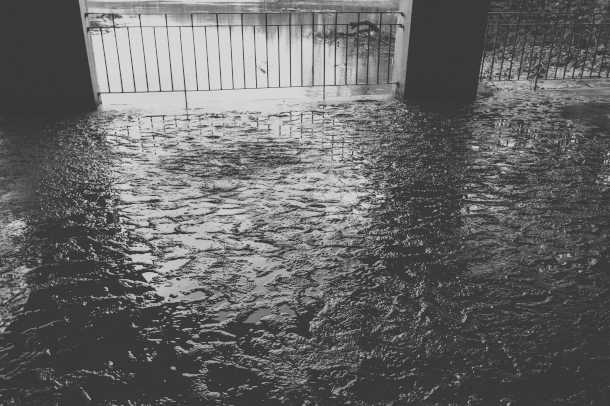
Prisons are often unequipped to deal with severe weather events. At the Catahoula Correctional Center in 2020, Hurricane Laura caused the lights and water to go out for four to five days. (Photo: RubyT, Flickr, CC BY 2.0)
CURWOOD: Talk to me about the human cost to families as well as those people incarcerated when these issues are being consistently ignored. Sounds like the Biden administration is studying, making promises, sounds like in California, again, there's studies and making promises, but I haven't heard you say that, really, a lot of action is being taken.
BROWN: So, one of the families that I spoke to was Casey and Justin Phillips in Texas. Justin Phillips was incarcerated at the Coffield Unit, which is a state prison that lacked air conditioning. And he has a rare kidney condition that's quite severe. So, kidney conditions can be particularly exacerbated by extreme heat, and that was the case for Justin. So, during the year that Justin Phillips was incarcerated without air conditioning, he said that his health really deteriorated. In addition to not being able to take his medications all the time, because he said that he was not always escorted by guards to do so, he also was unable to routinely take his blood pressure medication. That's because the medication made him more sensitive to the heat. So, Justin's wife, Casey basically fought for him day in and day out. She was calling the prison and trying to get him transferred. She was pushing for them to give him the care that he needed. And ultimately, he was transferred into an airconditioned unit. By then, his kidney function was much worse. So, throughout that fight, Casey began to realize the scale of the problem. And she started an organization called Texas Prison Air Conditioning Advocates. Alongside other family members of incarcerated people and formerly incarcerated people, she began to push the state legislature for action. Now, that organization is called Texas Prison Community Advocates, and they're continuing that fight. But Casey ultimately had to step down because she needed to care for her own health and the health of her family members. Justin has since been released, and now he's on dialysis daily, and his prognosis for the next five years is not great.

Alleen Brown is a New York-based reporter focused on environmental justice issues. Her work has been published by The Intercept, The Nation, In These Times, YES! Magazine, and various Twin Cities publications. (Photo: Courtesy of Alleen Brown)
CURWOOD: Alleen, to what extent is this problem related to the attitude of some people that well, prisoners are supposed to be punished and we shouldn't coddle them?
BROWN: Yeah, I mean, I think that's something that's often raised when the question of installing air conditioning comes up. You know, that they did something wrong and that this is the consequence. But for one thing, I think a lot of reporting and investigations over in recent years have showed that our system of mass incarceration is not perfect, and a lot of people who are innocent end up in these facilities. I think that I would also again point back to the Eighth Amendment that bars cruel and unusual punishment. Some judges have affirmed that some of these extreme heat conditions do qualify as cruel and unusual punishment. And if we're looking at a climate that is going to get dramatically hotter, then that legal argument will only become stronger. You know, another statistic that came out of our reporting that was really striking to me is that today, no carceral institution is located in a county with more than 50 days a year at 105 degrees. By 2100, almost 700 facilities will be in counties that see that level of heat, mostly in Texas, Florida, and Louisiana. I think we can all agree that 50 days a year at 105 degrees is quite severe.
CURWOOD: Alleen Brown has covered the intersection between the climate crisis and mass incarceration for publications including The Intercept. Thanks so much for taking the time with us today.
BROWN: Thank you so much for having me.
Links
The Intercept | “Climate and Punishment”
The Intercept | “Video: Politicians Ignore Vulnerable Prisoners as Climate Change Worsens”
Living on Earth wants to hear from you!
Living on Earth
62 Calef Highway, Suite 212
Lee, NH 03861
Telephone: 617-287-4121
E-mail: comments@loe.org
Newsletter [Click here]
Donate to Living on Earth!
Living on Earth is an independent media program and relies entirely on contributions from listeners and institutions supporting public service. Please donate now to preserve an independent environmental voice.
NewsletterLiving on Earth offers a weekly delivery of the show's rundown to your mailbox. Sign up for our newsletter today!
 Sailors For The Sea: Be the change you want to sea.
Sailors For The Sea: Be the change you want to sea.
 The Grantham Foundation for the Protection of the Environment: Committed to protecting and improving the health of the global environment.
The Grantham Foundation for the Protection of the Environment: Committed to protecting and improving the health of the global environment.
 Contribute to Living on Earth and receive, as our gift to you, an archival print of one of Mark Seth Lender's extraordinary wildlife photographs. Follow the link to see Mark's current collection of photographs.
Contribute to Living on Earth and receive, as our gift to you, an archival print of one of Mark Seth Lender's extraordinary wildlife photographs. Follow the link to see Mark's current collection of photographs.
 Buy a signed copy of Mark Seth Lender's book Smeagull the Seagull & support Living on Earth
Buy a signed copy of Mark Seth Lender's book Smeagull the Seagull & support Living on Earth

